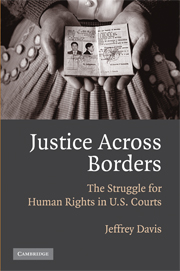Book contents
- Frontmatter
- Contents
- Acknowledgments
- JUSTICE ACROSS BORDERS
- 1 The Seeds of Legal Accountability
- 2 Competing Forces in the Struggle for Accountability: An Overview of the Issues Entangling ATS Litigation
- 3 Human Rights Entrepreneurs: NGOs and the ATS Revolution
- 4 Separation of Powers and Human Rights Cases
- 5 No Safe Haven: Human Rights Cases Challenging Foreign Countries and Nationals
- 6 Holding Corporations Accountable for Human Rights Violations
- 7 Sorting through the Ashes: Testing Findings and Predictions through Quantitative Analysis
- 8 Impacts and Conclusion
- Index
- References
7 - Sorting through the Ashes: Testing Findings and Predictions through Quantitative Analysis
Published online by Cambridge University Press: 05 June 2012
- Frontmatter
- Contents
- Acknowledgments
- JUSTICE ACROSS BORDERS
- 1 The Seeds of Legal Accountability
- 2 Competing Forces in the Struggle for Accountability: An Overview of the Issues Entangling ATS Litigation
- 3 Human Rights Entrepreneurs: NGOs and the ATS Revolution
- 4 Separation of Powers and Human Rights Cases
- 5 No Safe Haven: Human Rights Cases Challenging Foreign Countries and Nationals
- 6 Holding Corporations Accountable for Human Rights Violations
- 7 Sorting through the Ashes: Testing Findings and Predictions through Quantitative Analysis
- 8 Impacts and Conclusion
- Index
- References
Summary
In the preceding chapters, I examined in detail the many forces that control the development and outcome of Alien Tort Statute (ATS) and Torture Victim Protection Act (TVPA) cases in U.S. courts. In Chapter Seven, I take a quantitative look at these forces. The purpose of this chapter is to measure the relationships identified above in a systematic manner, controlling for competing factors. The analysis will address several research questions: What factors contribute to ATS case outcomes in the district courts and courts of appeals? Does ideology drive judicial decision making in these cases? Are human rights NGOs more likely to prevail than private counsel? How persuasive is the executive branch when it advocates a result in ATS cases? Are federal courts abandoning traditional doctrines of territorial jurisdiction and sovereignty and edging toward universal jurisdiction?
These issues can be effectively explained using multivariate logistic regression analysis. To analyze the factors that contribute to outcomes in ATS cases, I begin with two models. In the first, I included every federal district court case after 1959 in which the court decided an issue related to the scope, meaning, or applicability of the ATS. In the second model, I included every court of appeals case after 1959 in which the court decided an ATS issue. The dependent variable in each model was a bivariate variable that was scored 1 if plaintiffs won the ruling and 0 if defendants prevailed.
Information
- Type
- Chapter
- Information
- Justice Across BordersThe Struggle for Human Rights in U.S. Courts, pp. 239 - 265Publisher: Cambridge University PressPrint publication year: 2008
